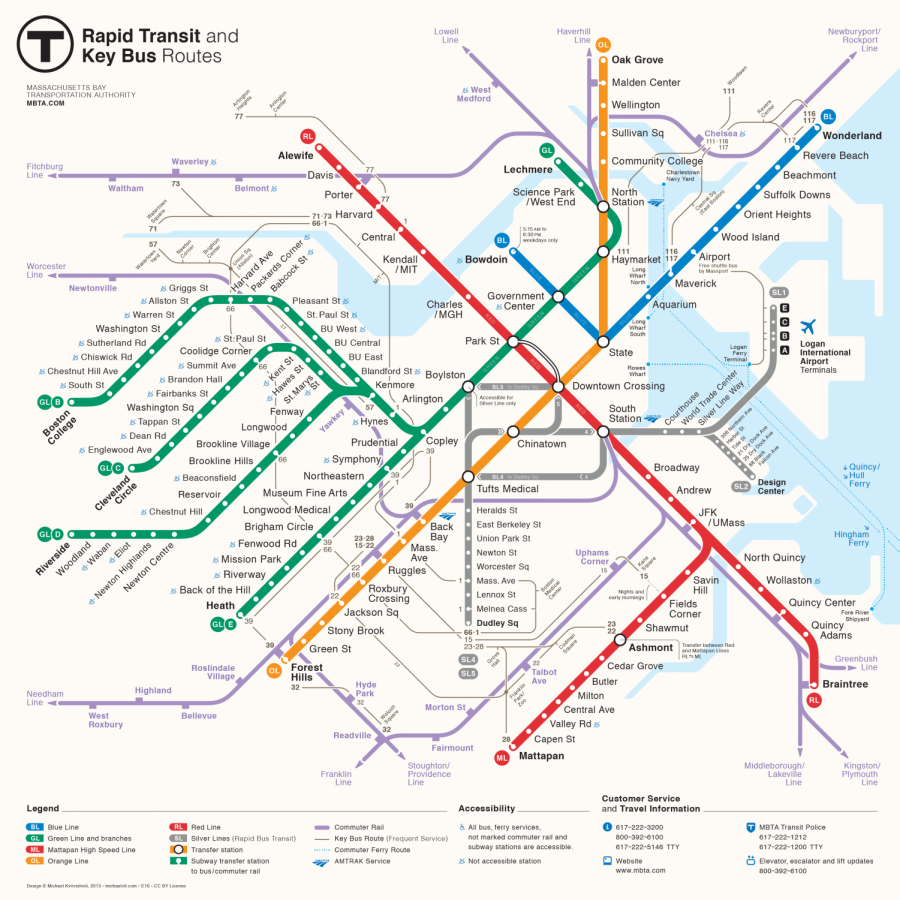MBTA delays, fare hikes and line shut-downs have left Suffolk University commuters feeling frustrated.
According to U.S. News & World Report, 73% of Suffolk students live off campus and commute to a campus located in the heart of a busy, traffic-heavy city.
Many students lease apartments in the neighborhoods surrounding downtown, including Allston/Brighton, East Boston, Somerville, Cambridge and Brookline.
The rent there may be significantly cheaper compared to apartments located in downtown Boston, but students in these neighborhoods are required to ride the colorful network of MBTA trains every day to get to work and classes.
The MBTA has long been plagued with the issue of aging cars, derailments, scheduling misinformation and breakdowns. This summer, commuters on the red line and blue line were forced to walk along the tracks in dark tunnels to return to a station after their cars derailed during the peak commuting hours according to Common Wealth Magazine. Images began circulating online of droves of people waiting outside the Maverick blue line station to be ushered into shuttle buses downtown. Other videos made their rounds on Twitter showing people marching through red line tunnels after their train derailed in June.
Boston officials hoped that repairs throughout the summer would lead to a smooth fall for commuting on the T, according to The Boston Globe. However, issues have only gotten worse as students returned to the city for the semester.
This past week alone has resulted in two major incidents on the MBTA.
The orange line, which has been closed on weekends during October, remained closed Monday morning after a construction incident, according to transit police.
The second incident took place at the Beverly commuter rail station for the Newburyport/Rockport line on the morning of Oct 23. An Emerson College professor was struck by a commuter rail train while riding a bicycle. The incident led to “severe delays and some cancelled trains,” transit police said.
Lukas Phipps, a Suffolk University junior and Commuter Senator at Large for SGA, was directly affected by the incident. w
While the cause for the delay was understandable, Phipps said delays in general on the line occur too often.
“I was on the train that got delayed as a result,” Phipps said. “It happens pretty frequently. I missed work because of it. I missed class today as a result. I’ve been late to presentations too.”
Phipps has commuted every year during his time at Suffolk and spends about four days each week commuting back and forth to the city. Without delay, his commute generally takes an hour and ten minutes each direction. However, he has waited nearly three hours in the past to arrive to class due to engine failures on the line.
These delays and train issues are directly affecting commuter students, according to Phipps. Students are less inclined to attend club meetings or campus events if it means bracing the possibility of delays.
“The commuters don’t feel as involved on campus,” he said.
Phipps is actively working as SGA Commuter Senator at Large to remedy the situation of a difficult commute for students. He does not believe the fare increases in July, which raised all prices of tickets for every line by about 6.3%, are a solution to the number of problems.
“I think [the MBTA] needs to upgrade their technology…I don’t think that issue is fixed by raising the rates…I’d like to see the price reduced to encourage commuting…invest a lot more money from the state budget into transportation…I don’t think they’re taking it seriously,” Phipps said.
Matthew O’Brien, a senior politics, philosophy and economics major and Mendon resident, takes the Franklin line on the commuter rail twice a day. O’Brien, like many other Boston-area students, documents his experiences with MBTA issues on Twitter and voices his concerns to state legislators.
“Last Thursday, I got on my usual 6:20 p.m. train home from South Station,” O’Brien said. After getting settled in, we were told the train was no longer going to Franklin, and we had to get off. Our train was delayed for more than 20 minutes after that. Eventually, we finally left the station, but encountered an additional 30 minute delay due to a mechanical failure.”
“These types of issues are sadly the norm and not the exception with today’s MBTA,” said O’Brien.
O’Brien commutes from home in order to save money. His commute generally involves an hour and ten minutes on the train each direction, but within the past year, his longest commute has been two and a half hours due to delays.
“It’s time the Suffolk community, not just commuters, organizes against the MBTA’s unreliability in the midst of unfair fare increases,” O’Brien said. “The entire Suffolk community must stand in solidarity with commuter students, be it through protests, letters to the editor, or even engaging with candidates for city council and the state legislature.”
Off-campus students are not the only ones directly affected by the MBTA issues. Students living in the 1047 Commonwealth Ave residence hall take the green line if they are using the MBTA to get to campus.
Residents enjoy the perks of dorm life, such as security and access to resources such as resident assistants (RAs), but face the same problems commuters have with transportation while paying the on-campus price tag.
Patrick Lovelace, a junior public relations major and RA at the 1047 residence hall, has seen the stress that the commute causes his residents.
“The longest commute I’ve had was around an hour and a half due to the green line,” Lovelace said.
Suffolk provides residents and RAs with semester T passes, according to Lovelace. However, residents still face breakdowns and delays and sometimes can’t attend class on time— or at all. Luckily, professors have been lenient with tardiness since they face the same commuting issues as well, Phipps and O’Brien both said.
Governor Charlie Baker and MBTA officials have promised to work to fix the current situation. The MBTA was unable to be reached for a statement at the time of this publication, but students can receive updates on delays from the MBTA’s official website, mbta.com/alerts or its official Twitter, @MBTA.



















